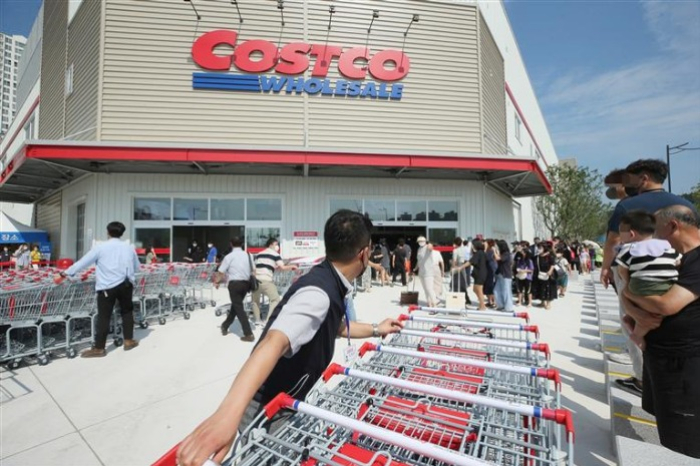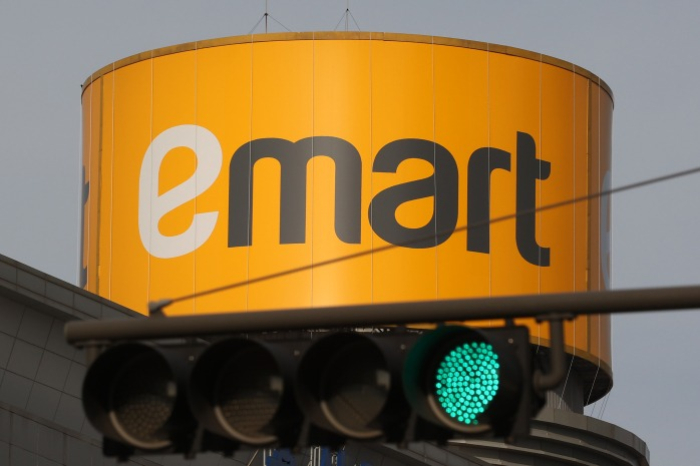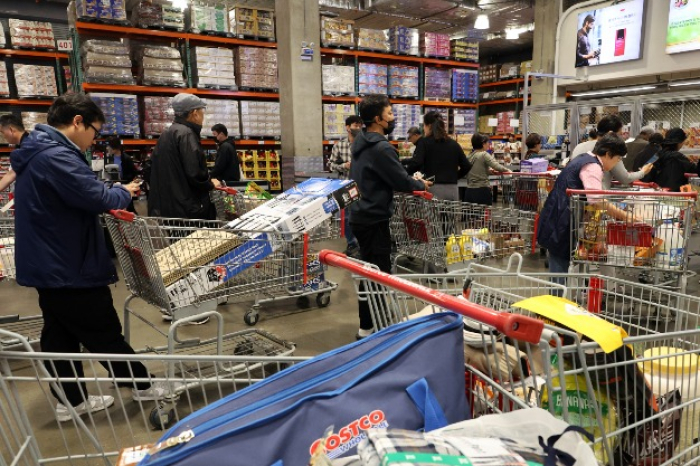Retail
US warehouse giant Costco outperforms peers in S.Korea
Costco’s Korean operation reported 15.8% and 7.6% on-year gains in operating profit and sales in fiscal year 2024
By Nov 19, 2024 (Gmt+09:00)
3
Min read
Most Read
LG Chem to sell water filter business to Glenwood PE for $692 million


KT&G eyes overseas M&A after rejecting activist fund's offer


Kyobo Life poised to buy Japan’s SBI Group-owned savings bank


StockX in merger talks with Naver’s online reseller Kream


Meritz backs half of ex-manager’s $210 mn hedge fund



Membership fees couldn't keep cost-conscious South Korean consumers from rushing to Costco stores to buy big-box items at lower prices, leading the US warehouse store giant to outdo its Korean retail rivals grappling with dwindling sales in the aftermath of inflation shocks.
According to Costco Wholesale Korea’s filing of its financial and income statements for the fiscal year 2024 ending Aug. 31 to Korea’s Financial Supervisory Service on Tuesday, it reaped 218.5 billion won ($156.8 million) in operating profit and 6.53 trillion won in sales, up 15.8% and 7.6%, respectively, from the previous fiscal year.
The Korean operation of Costco Wholesale Corp. outperformed most of its Korean retail peers, suffering from falling sales and profits.
The country’s largest supermarket chain operator E-Mart Inc. saw a 2.5% loss in sales for the first three quarters of this year. Its operating profit dropped 8.6% to 66.8 billion won over the same period.
Another homegrown retail giant, Lotte Mart’s operating profit and sales also shrank 2.4% and 4% on-year, respectively, to 71.7 billion won and 4.11 trillion won.
Costco’s Korean operation outpaced native Korean retail giants in its average sales per store, which hit 343.6 billion won.
This is four to five times more than that of Korean big-box stores.

Costco Wholesale Korea operates 19 stores across Korea, but its sales for fiscal year 2024 beat last year’s sales of Lotte Mart, which runs 111 stores, by about 1 trillion won.
The US big-box store’s result in the Korean market came as a surprise, quashing previous concerns that its sales in Asia's No. 4 economy could stagnate this year amid fierce competition from online giants like Coupang Inc.
MEMBERSHIP FEES OFFSET LOW PRICES
Costco’s ability to offer products at lower prices has been the main driver of its Korean operation’s sustainable sales growth for years.
The US parent buys products in bulk to distribute them to its 891 stores across the globe, a secret to Costco's lower prices in any country.
It also limits the number of product choices offered in each store, allowing a typical Costco store to stock 4,000 types of items.
That is almost one-tenth the number of Korean big-box stores’ item choices; the limited number of product types maximizes the benefits of its small profits and quick returns strategy, industry analysts said.
Costco Wholesale Korea also targets a 15.1% profit margin per product, relatively low compared to Korean retailers' targets, such as E-Mart's 26.9%.
Despite such low margins, Costco enjoyed handsome profits thanks to its membership fees.
The membership-based warehouse club collects 38,500 won for a basic membership fee in Korea and 80,000 won for a premium membership fee.

The US parent raked in $4.8 billion profit from membership sales in fiscal year 2024, accounting for more than half of its entire annual operating profit.
Its online store sales also fared better than expected in the year with 16.2% growth.
Despite higher price tags for the same products sold in stores, its club members in Korea still opted for online products that non-member consumers can purchase to enjoy the same-day delivery service.
ROSY OUTLOOK FOR COSTCO
The outlook for Costco’s business, including its Korean operation, looks bright as cost-conscious consumers are expected to continue to want bang for their buck.
Its sales in other countries, including its US home, as well as Canada and Japan, increased, helping the US parent see a 5.9% rise in consolidated sales to $249.6 billion in fiscal year 2024.
Its stock has soared with a 58.3% gain over the past year, reflecting high expectations for its business prospects, in stark contrast to Korean retail stocks on the decline over the same period.
Write to Jae-Kwang Ahn at ahnjk@hankyung.com
Sookyung Seo edited this article.
More to Read
-
 Corporate restructuringKorea’s E-Mart to delist troubled building unit for restructuring
Corporate restructuringKorea’s E-Mart to delist troubled building unit for restructuringSep 30, 2024 (Gmt+09:00)
2 Min read -

-

-
 RetailLotte Mart at Seoul Station redesigned to lure foreign shoppers
RetailLotte Mart at Seoul Station redesigned to lure foreign shoppersSep 14, 2023 (Gmt+09:00)
1 Min read -
 The KED ViewFalling on deaf ears: Costco Korea cart pusher's death
The KED ViewFalling on deaf ears: Costco Korea cart pusher's deathAug 13, 2023 (Gmt+09:00)
4 Min read
Comment 0
LOG IN


